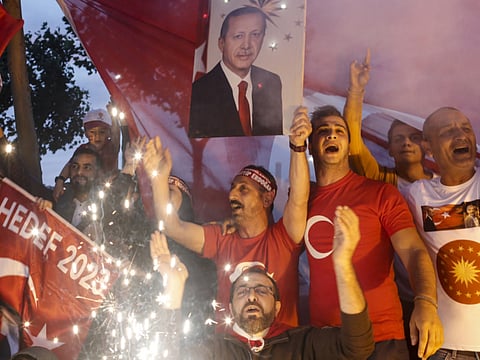Five takeaways from Erdogan’s win in Turkey
His re-election as president may signal a new and pivotal moment for a country that straddles Europe and Middle East

Against a backdrop of widespread repression and a weakened economy, President Recep Tayyip Erdogan of Turkey was re-elected last Sunday, while his alliance won a majority in the parliament.
Formerly prime minister, Erdogan was elected President in 2014 and, after a failed coup in 2016, persuaded voters to change the constitution to transform the once-ceremonial job into a position with executive control of the government. Last Sunday’s election signalled a new era for Turkey, a pivotal country straddling Europe and the Middle East.
Here is where Turkey stands after the election.
■ Erdogan’s Grip on executive power is official:
In theory, Erdogan’s re-election as president gives him sweeping powers that he has never wielded before. Because of changes to the Turkish Constitution made last year, the president — not the prime minister — will now be the formal head of the Turkish government. Erdogan can now appoint ministers himself, issue decrees, make crucial appointments in the judiciary and authorise investigations of individual civil servants.
In practice, however, the nature of Erdogan’s role will change little, since he already informally exerted far more power than his position had technically allowed.
For instance, Erdogan has led Cabinet meetings since 2015, even though that is usually the prerogative of the prime minister. And few judges have dared to issue judgements unfavourable to Erdogan, particularly since the start of a purge of the judiciary that has led to the dismissal of around a quarter of all judges since 2016.
■ Voting is free, but the election was not fair:
With more than 86 per cent of Turks participating, the vote was considered free. But international observers said it took place under circumstances that had clearly favoured Erdogan.
His control of state media and his influence over most private outlets gave him “a notable advantage,” according to election observers from the Organisation for Security and Cooperation in Europe. Most opposition candidates were afforded just a few minutes of coverage by state broadcasters, compared with hundreds of hours for Erdogan.
One of Erdogan’s leading challengers, Selahattin Demirtas, was forced to conduct his campaign from prison because he had been jailed on politicised charges nearly two years ago, along with several of his lawmakers.
And since the election took place under a state of emergency, severe restrictions impinged on the opposition’s ability to hold rallies and protests.
With more than 100,000 alleged dissidents arrested in the past two years, and a similar number dismissed or suspended from their state jobs, the campaign took place in what Amnesty International described as “a climate of fear” amid a crackdown following the failed military coup of 2016.
■ Turkey’s economy may weaken further:
Erdogan’s recent economic interventions helped to cause a loss in the lira’s value — and the currency problem could worsen now that he has been returned to office.
For most of his time in power, Erdogan had a reputation for strong economic management, partly because of spectacular economic growth under his watch during the 2000s. But his economic reputation weakened in May, when Erdogan threatened to take greater control of Turkey’s central bank if he won re-election, a move that frightened investors, and caused the lira to plummet, and the price of food to rise. Since voters failed to punish him for his intervention, Erdogan may now feel emboldened to follow through on his promise — which would be a disaster for the lira, inflation and those invested in debt.
When he first came to power in 2003, Erdogan brought Turkey closer to Europe — by accelerating membership negotiations with the European Union — and sought a historic settlement with the country’s Kurdish minority. But to maintain the support of nationalist voters in recent years, he has increasingly picked fights with European politicians, led a campaign of repression in Kurdish areas, and — to the frustration of the US, drawn increasingly close to President Vladimir Putin of Russia.
These dynamics are likely to be compounded by the election result, said Marc Pierini, a former EU ambassador to Turkey.
Erdogan’s victory was partly the outcome of his alliance with a far-right party, the Nationalist Movement Party, with anti-western and anti-Kurdish views Erdogan must continue to accommodate.
Erdogan’s victory is also bad news for the US-backed Syrian Kurdish forces that have carved out an independent enclave in northern Syria, along Turkey’s southern border, which Erdogan regards as a threat to Turkish security. Emboldened by his victory, Erdogan may see no reason to abandon his strategy of chasing the Syrian Kurds away from key areas of northern Syria.
■ The opposition is stuck between a rock and a hard place:
The unusually spirited performance of the opposition in such tough circumstances either bodes well for them in the future — or highlights the futility of running against Erdogan in such biased circumstances.
Muharrem Ince, Erdogan’s closest rival in the presidential race, won plaudits for engaging in an inclusive and feisty campaign — and may now have enough momentum to start a new movement. Turkey is heavily polarised, but he is interested in reaching out to the Kurds and the religious conservatives. If he plays his cards well he is the man for the future.
Other analysts are more pessimistic, and questioned whether the opposition should continue to legitimise a rigged system by taking part in elections.
— New York Times News Service
Palko Karasz is a columnist and digital editor with a focus on life and arts in Eastern Europe.


